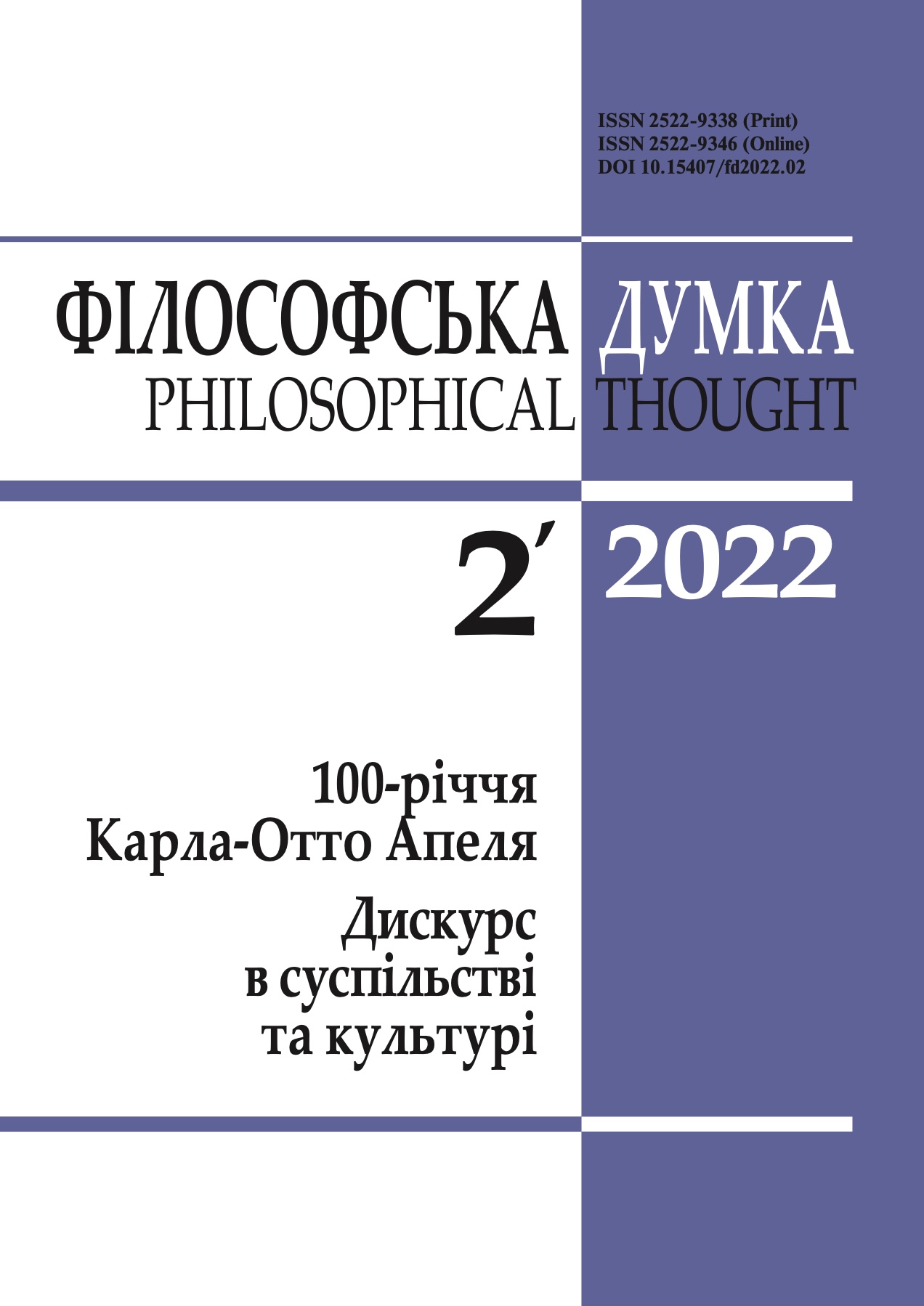ON THE DIFFERENCES BETWEEN HEIDEGGER’S AND FINK’S INTERPRETATIONS OF HEGEL’S CONCEPT OF EXPERIENCE OF CONSCIOUSNESS
YOUNG SCIENTIST’s PAGE
DOI:
https://doi.org/10.15407/fd2022.02.157Keywords:
experience of consciousness, German idealism, phenomenology, European philosophy, Hegelian studiesAbstract
The subject of this article are Martin Heidegger’s and Eugen Fink’s interpretations of Hegel’s concept of experience of consciousness examined in the light of the history of the development of German Hegelian studies. Article aims at revisiting and comparison of those original interpre- tations formulated by the prominent followers of phenomenological philosophy. Furthermore, in the course of the article those interpretations also get compared to the general approach of con- temporary Hegelian studies to interpreting the concept of experience of consciousness.
The experience of consciousness is indeed one of the most problematic concepts of Hegel’s philosophy and the key concept of the “Phenomenology of Spirit”. Therefore, with regard to the role this concept has in the narrative of “Phenomenology...”, the interpretations of this concept, examined in the present article allow us to inspect, in a general outlook, Fink’s and Heidegger’s interpretational approaches towards all the “Phenomenology...”.
Having examined each of the interpretations, a comparison of the two is conducted, that results in pointing out the key differences between those, which also relate to the interpretations of all the “Phenomenology...”. The article closes up with a brief inspection of the relation of Heidegger’s and Fink’s interpretational approaches to the contemporary scholar consensus on the experience of consciousness in the “Phenomenology of Spirit”.
References
Hegel, G. W. F. (2021). Phenomenology of spirit. Introduction. [In Ukrainian] Sententiae. Re- trieved from: https://sententiae.vntu.edu.ua/index.php/sententiae/article/view/577
Dulckeit, K. (2006). Language, Objects, and the Missing Link: Toward a Hegelean Theory of Reference. In: J. O'Neill Surber (Ed.), Hegel and language (pp. 145-164). Albany: State University of New York Press
https://doi.org/10.5840/hsaproceedings2006189
Fink, E. (2012). Hegel: Phänomenologische Interpretationen der "Phänomenologie des Geistes». Frankfurt am Main : Klostermann.
Hegel, G. W. F. (1999). Phänomenologie des Geistes. In: G. W. F. Hegel, Hauptwerke in sechs Bänden (Bd. 2, SS. 1-448). Hamburg : Meiner.
Heidegger, M. (1993a). Erläuterung der «Einleitung» zu Hegels «Phänomenologie des Geistes». In: M. Heidegger, Gesamtausgabe (Bd. 68, SS. 65-150). Frankfurt am Main : Klostermann.
Heidegger, M. (1997a). Der deutsche Idealismus und philosophische Problemlage der Gegen- wart. In: M. Heidegger, Gesamtausgabe (Bd. 28, SS. 1-346). Frankfurt am Main : Klostermann.
Heidegger, M. (1993b). Die Negativität: eine Auseinandersetzung mit Hegel aus dem Ansatz in der Negativität. In: M. Heidegger, Gesamtausgabe (Bd. 68, SS. 3-64). Frankfurt am Main : Klostermann.
Heidegger, M. (2003). Hegels Begriff der Erfahrung. In: M. Heidegger, Gesamtausgabe (Bd. 5, SS. 115-208). Frankfurt am Main : Klostermann.
https://doi.org/10.5771/9783465142362-115
Heidegger, M. (1997b). Hegels Phänomenologie des Geistes. In: M. Heidegger, Gesamtausgabe (Bd. 32, SS. 1-216). Frankfurt am Main : Klostermann.
Hösle, V. (2013). Eine kurze Geschichte der deutschen Philosophie: Rückblick auf den deutschen Geist. München : Beck
https://doi.org/10.17104/9783406648656
Inwood, M. (1992). Hegel dictionary. Oxford : Blackwell.
https://doi.org/10.1111/b.9780631175339.1992.00001.x
Pippin, R. (1999). Hegel's idealism: the satisfactions of self-consciousness. Cambridge : Cambridge University Press.
Vikko, R. (2009). The logic question during the first half of the nineteenth century. In: L. Harrpantha (Ed.), The development of modern logic. (pp. 203-221). Oxford: Oxford UP.
https://doi.org/10.1093/acprof:oso/9780195137316.003.0024
Westphal, K. (2003). Hegel's epistemology: a philosophical introduction to the Phenomenology of spirit. Indianapolis, IN : Hackett.
Downloads
-
PDF (Українська)
Downloads: 341
Published
How to Cite
Issue
Section
License
Authors who publish with this journal agree to the following terms:
- Authors retain copyright and grant the journal right of first publication.
- Authors are able to enter into separate, additional contractual arrangements for the non-exclusive distribution of the journal's published version of the work (e.g., post it to an institutional repository or publish it in a book), with an acknowledgement of its initial publication in this journal.
- Authors are permitted and encouraged to post their work online (e.g., in institutional repositories or on their website) prior to and during the submission process, as it can lead to productive exchanges, as well as earlier and greater citation of published work (See The Effect of Open Access).


